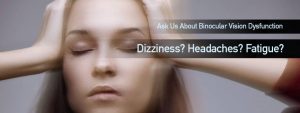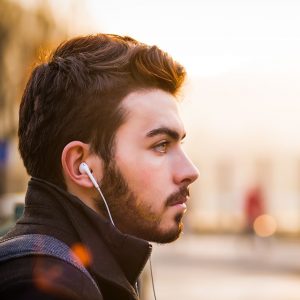Do you suffer from motion sickness while riding in a car, airplane, boat or amusement park ride? You may have BVD.
Binocular vision dysfunction (BVD) is a condition where the eyes are misaligned and the visual system struggles to send one clear image to the brain.
BVD can result in a number of uncomfortable symptoms that can impact your life, with motion sickness being among the most common.
Causes of BVD
BVD can occur from any of the following conditions:
- Brain injury
- Stroke
- Neurological disorders
- Facial asymmetry-where one eye is physically higher than the other
- Nerve or eye muscle dysfunction
What are the signs of BVD?
Binocular vision dysfunction causes a host of uncomfortable symptoms, including:
- Eye strain
- Double vision
- Light sensitivity
- Poor depth perception
- Difficulty reading
- Reduced attention span
- Dizziness and disorientation
- Difficulty navigating through crowds
- Anxiety and panic attacks
- Nausea and vomiting
- Neck and shoulder pain
Motion sickness and BVD
Binocular vision dysfunction can cause nausea, dizziness and motion sickness, especially while riding in a car, boat, airplane or even an amusement park ride.
These symptoms surface as a result of the conflicting messages your brain receives from each of your body’s three balance-sensing systems: your eyes, inner ears and the position-sensing nerves in your legs, arms, head, and neck.
For example, when sitting on a ride at the amusement park that’s spinning you around and upside down, your eyes see one thing, your position-sensing nerves feel another, and your inner ears sense something else. This causes confusion within your visual and vestibular systems, resulting in nausea and motion sickness.
The Find an Eye Doctor directory provides a list of eye doctors near you that may be able to help diagnose and treat BVD.
SEE RELATED: What is Binocular Visual Dysfunction (BVD)?
Signs of motion sickness
- Dizziness
- Cold sweats
- Increased saliva
- Nausea and vomiting
- Rapid breathing or gulping for air
- Fatigue
- Headache
- Inability to concentrate
- Irritability
- Pale skin
BVD motion sickness triggers
Actions that can trigger the symptoms of motion sickness include:
- Looking at stationary objects, while in motion
- Driving around curves
- Being in huge spaces with high ceilings, such as a supermarket or mall
- Watching oncoming traffic
- Moving your head up and down or side to side
- Riding as a passenger in a car
- Sailing on a boat or a cruise ship
- Standing up quickly from a seated position
- Reading a book or watching a video while in motion
Can BVD cause vertigo or dizziness when driving?
Unfortunately, the answer is yes.
Vertigo and dizziness can strike when you are driving, and sometimes come on suddenly, without warning.
Suffering from dizziness, vertigo or even motion sickness while you are behind the steering wheel can be quite scary and anxiety provoking.
These symptoms often surface when you think you are driving at high speeds, but really other cars are whizzing past, while moving your head side to side to check traffic, making a sharp turn or even just being aware of all the stimuli around you.
Treatment for motion sickness associated with BVD
BVD is successfully treated with micro-prismatic lenses prescribed by an eye doctor.
Prismatic lenses work to correct the misalignment in your eyes by manipulating incoming light before it enters your eyes so that when the images from the two eyes reach the brain, the brain can fuse them into a single image.
The prisms in the glasses ‘trick’ the brain into thinking your eyes are properly aligned, causing you to see just one object and preventing eye muscle strain.
Usually, patients find that their motion sickness symptoms gradually subside or completely disappear when they wear prescribed prism lenses.
Eye doctors may also include a customized program of vision therapy, which develops stronger communication between the eyes, the visual system and the brain.
When to call an eye doctor
If you suffer from motion sickness, schedule an eye exam with an eye doctor near you that is trained and experienced in diagnosing and treating BVD.
LEARN MORE: Guide to Binocular Visual Dysfunction (BVD)
If you suffer from motion sickness, binocular Vision Dysfunction (BVD) may be the underlying cause.
Fortunately, BVD can be successfully treated to help you see more clearly and comfortably— without the motion sickness.










